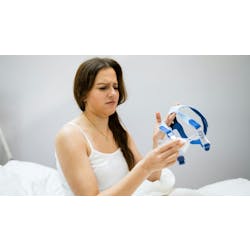When providing a comprehensive level of care to patients with specialized health-care needs (SHCNs), it’s critical to be aware of their oral manifestations and the medications they take. Depending on the specific need, various oral manifestations may present, which will ultimately tailor practice delivery and treatment recommendations.
Here I’ll discuss oral hygiene aids to mitigate these oral manifestations for patients and caregivers. Dental professionals must recognize the barriers caregivers face to prioritize daily oral hygiene for patients with SHCNs. Patients want autonomy but still need assistance. You try to inform and guide patients with their oral hygiene routine, but they often lack the skills to perform oral hygiene tasks, and some exhibit physical restraints.1
Here is a guide based on patients’ SHCNs to provide caregivers with techniques to provide oral hygiene care, as well as some product suggestions that may be beneficial for different patients. Empowering the caregiver and patient with resources will help alleviate challenges and promote an optimal oral hygiene routine that supports patients’ needs.
Behavioral SHCNs
A behavioral SHCN involves any persistent and repetitive behavior that violates societal norms and seriously impairs a person’s functioning or creates distress in others.2 This covers a wide range of disorders, such as attention deficit hyperactivity disorder (ADHD) and autism spectrum disorder (ASD).3-5 Due to risk factors like xerostomia, sensitivity to sodium lauryl sulfate (SLS), and possible limited ability to brush, these products could be beneficial‑‑Elevate Fluorimax 5000 toothpaste, Spry gum or mints to incorporate xylitol into the patient’s routine, the Curaprox Samba brush for dexterity or brushing limitations, and Curaprox Be You toothpaste with no SLS.
Congenital SHCNs
Congenital SHCNs are structural or functional anomalies that occur during in utero and are also known as birth defects.6 This includes patients that present with Down syndrome or a congenital cardiac disorder.3-5,7,8 In addition to the products above, antimicrobial and pH elevating sprays such as CariFree CTx2 are oral hygiene medicaments that support a healthy oral microbial environment and are easy for patient and caregiver to use.
Nutritional counseling for caregivers of this patient population is also critical in caries management and disease prevention. This can be something as simple as encouraging frequent water consumption and recommending anticariogenic snacks that suit a patient’s lifestyle. These recommendations speak volumes for caregivers who are not sure how to handle their patient’s oral hygiene from a preventive rather than reactive standpoint.
Developmental SHCNs
Developmental needs are impairments in either a physical, learning, language, or behavior area that begin during someone’s developmental period, for example, cerebral palsy.9 These patients often face various challenges performing daily oral hygiene care.3
The Curaprox Samba brush is ideal for patients with dexterity concerns, or if the caregiver is unable to comfortably use a brush with the patient. Using prescription-strength fluoride products like Elevate FluoriMax 5000, xylitol products such as Spry gums or mints, and brushing with an antimicrobial rinse like TheraBreath Deep Clean Antiseptic instead of rinsing, all help with an individualized preventive routine. Other ideas for caregivers are to place the patient in a semi-reclined position when brushing, and to be mindful of sugar content in liquid medications if the patient is taking any.10
Cognitive SHCNs
Cognitive SHCNs are medical conditions that influence how the brain processes and stores information. This has a negative effect on memory, attention, perception, and thinking abilities.11 Patients with an intellectual disability (ID) present with a cognitive SHCN and often have a hard time communicating their wants and needs.12,13 With this in mind, establishing an oral hygiene routine that the caregiver understands and the patient is comfortable with are critical to ensure they take preventive oral hygiene measures.
The Curaprox Samba brush is useful to provide autonomy for the patient and to ensure adequate plaque removal. Using pH-elevating sprays like CariFree CTx2 and brushing with an antimicrobial rinse like TheraBreath Deep Clean Antiseptic will assist with caries prevention and reduce gingival inflammation. Floss holders like the Clix Flosser or Floss Reach support autonomy while alleviating dexterity concerns around flossing. Another issue to discuss with caregivers is reducing the cariogenic content of a patient’s diet. Each of these components are critical to support patients and caregivers in achieving caries management and disease prevention.
Oral hygiene aids and routines should be tailored to patient preferences and needs. A product that works seamlessly for one patient may not work for another. It’s the responsibility of dental professionals to instruct and inform patients and caregivers about the products being recommended.
What products to use and how to use them can be a source of stress, and eliminating this for caregivers and patients will make them comfortable with oral hygiene prevention practices. Choosing the right products and creating a routine all team members understand is critical for the oral health maintenance of all patients with SHCNs.
References
1. Leme PAT, Nishiyama RR, Santos CL, et al. Coping strategies of caregivers in performing oral hygiene care in adults with special needs: a qualitative study. Spec Care Dentist. 2022;42:616-622.
2. APA Dictionary of Psychology. American Psychological Association. 2024. Accessed March 11, 2024. https://dictionary.apa.org/behavior-disorder
3. Patients with special needs. University of Washington School of Dentistry. 2011. Accessed February 11, 2023. https://dental.washington.edu/dept-oral-med/special-needs/patients-with-special-needs/
4. Attention-Deficit/Hyperactivity Disorder. National Institute of Mental Health. 2022 September 2022. Accessed February 11, 2023. https://www.nimh.nih.gov/health/topics/attention-deficit-hyperactivity-disorder-adhd
5. What is autism? Autism Research Institute. 2021. Accessed February 11, 2023. https://www.autism.org/what-is-autism/
6. Congenital disorders. World Health Organization. 2024. Accessed March 11, 2024. https://www.who.int/health-topics/congenital-anomalies#tab=tab_1
7. Facts about Down syndrome. Centers for Disease Control and Prevention. 2022 November 18, 2022. Accessed February 11, 2023. https://www.cdc.gov/ncbddd/birthdefects/downsyndrome.html
8. Congenital heart defects (CHDs). Centers for Disease Control and Prevention. February 2, 2023. Accessed February 11, 2023. https://www.cdc.gov/ncbddd/heartdefects/index.html
9. Facts about developmental disabilities. Centers for Disease Control and Prevention. 2022. Accessed March 11, 2024. https://www.cdc.gov/ncbddd/developmentaldisabilities/facts.html
10. What is cerebral palsy? Centers for Disease Control and Prevention. May 2, 2022. Accessed February 11, 2023. https://www.cdc.gov/ncbddd/cp/facts.html
11. Bakkour N, Samp J, Akhras K, et al. Systematic review of appropriate cognitive assessment instruments uses in clinical trials of schizophrenia, major depressive disorder, and bipolar disorder. Psychiatry Res. 2014; 216:291-302
12. Miller SR. A curriculum focused on informed empathy improves attitudes toward persons with disabilities. Perspect Med Educ. 2013; 2(3):114-125.
13. Facts about intellectual disability. Centers for Disease Control and Prevention. May 10, 2022. Accessed February 11, 2023. https://www.cdc.gov/ncbddd/developmentaldisabilities/facts-about-intellectual-disability.html
Annie Walters, MSDH, RDH, attended Northern Arizona University, where she spent time caring for individuals in Guatemala and Indian Health Service. She has a special interest in advancing access to care for individuals with specialized health-care needs. She’s a member of ADHA, and received her MS from the University of New Mexico, where she developed a chairside resource for RDHs to use for patients with specialized needs. She practices in Flagstaff, Arizona, and serves as part-time faculty at her alma mater. Contact her at [email protected].








